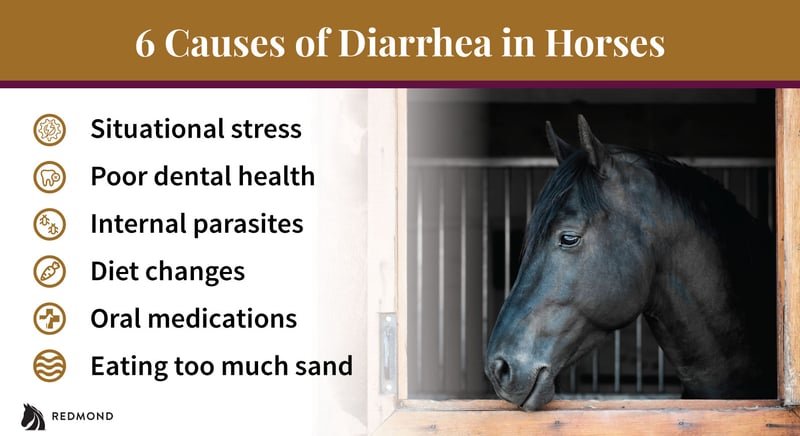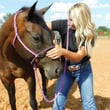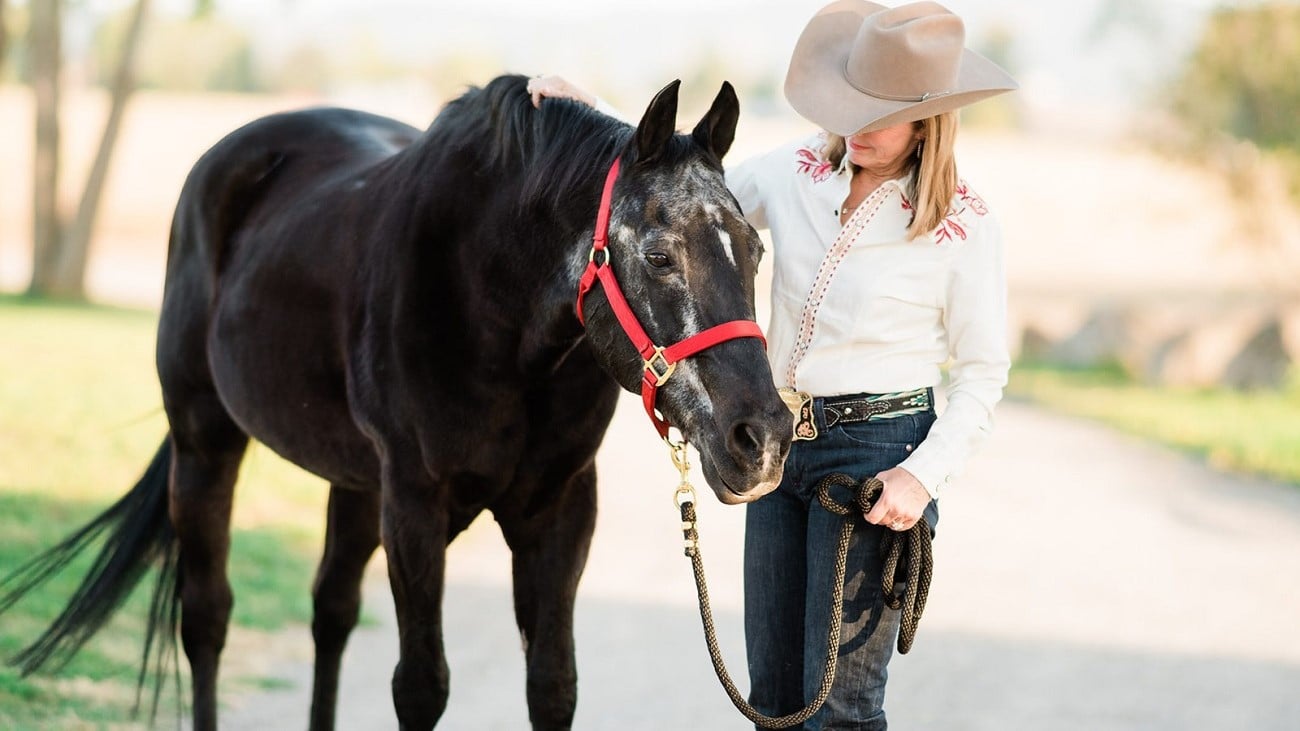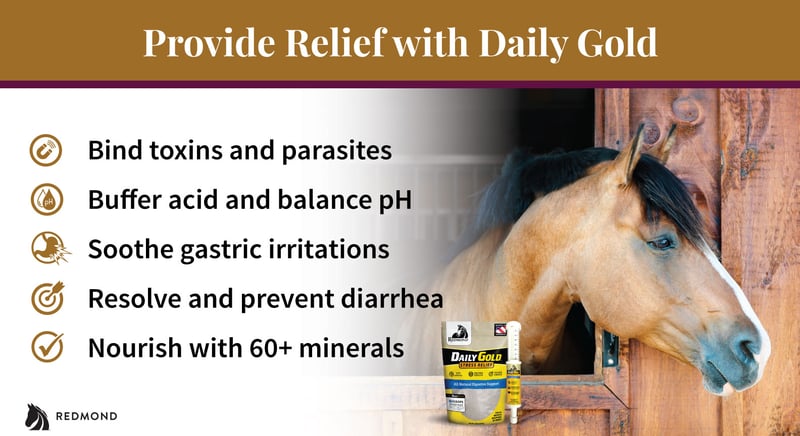Vet Advice: 6 Common Causes of Diarrhea in Horses & How to Treat It
May 05, 2023
Vet Advice: 6 Common Causes of Diarrhea in Horses & How to Treat It
In this post, Jessica Huntington, DVM, from Stephenville, Texas discusses common causes of horse diarrhea and recommendations to treat it. Dr. Huntington takes an integrative approach to the equine athlete by combining traditional veterinary medicine with chiropractic care and acupuncture.
Dealing with horse diarrhea is more than unpleasant and messy—it can be dangerous, leading to serious conditions like dehydration, electrolyte imbalances, weight loss, and even death if left untreated.
As a horse owner or caretaker, understanding the causes and treatment options for diarrhea is crucial for maintaining the health and wellbeing of your equine. In this blog we cover common causes of diarrhea in horses and effective recommendations for prevention, treatment, and management.
Why Does My Horse Have Diarrhea?
Diarrhea is a common gastrointestinal disorder characterized by loose or watery stools. An important function of the equine large colon is to regulate the amount of water absorbed in the body. If you have a horse with diarrhea, it may stem from one of these common instigators of intestinal upset.

1. Situational Stress
Have you ever noticed when you haul your horse, its manure may be a little loose during trailering or even afterward? This is an example of stress-induced diarrhea. Stress from traveling, prolonged heat, exercise, or performance can trigger loose stool in horses. Typically, you can expect one to two piles before it returns to normal.
2. Poor Dental Health
Using their teeth to masticate food, horses break down roughage into small pieces to aid in proper digestion. When horses have poor dentition, they're unable to properly chew, leading to longer forage length, which could result in equine diarrhea.
This is a good reason to get a dental checkup. Have your veterinarian examine your horse’s teeth to look for a problematic tooth or abnormality that may be an underlying cause of watery diarrhea.
3. Internal Parasites
Internal parasites have the ability to invade the colon, attach to the intestinal lining and compromise gut function. This decreases digestive ability and can cause loose manure.
To check for internal parasites, contact your veterinarian for a fecal egg count. This will allow them to identify which internal parasites are present and decide what dewormer is best suited for your horse.
4. Diet Changes
A rapid change of hay or grain, or feeding too much of either, can bring on diarrhea in horses. When diet changes, so does the bacterium in a horse’s GI tract. If that change is sudden, the gut microbiome can be disrupted.
Diet change should be a gradual process that happens over a period of three to four weeks. During week one, feed your horse three-fourths the amount of regular hay/grain and one-fourth of new hay/grain. At week two, feed one-half the amount of regular hay/grain and one-half of new hay/grain. Starting week three, feed one-fourth of regular hay/grain and three-fourths of new hay/grain. By week four, you can feed entirely the new hay/grain. This slow change will help your equine’s microbiome adjust properly.
5. Oral Medications
Supplements or medications can also be the culprit of loose manure or diarrhea. For example, a round of antibiotics targeted to kill bad bacteria will also kill good bacteria. This upsets the delicate balance of intestinal flora the GI tract needs to function properly. If you notice loose manure and your horse is or has been on medications recently, it’s best to call your veterinarian for further direction.
6. Eating Sand
Every day horses ingest incidental amounts of sand from their environment. Small amounts are normal and can usually be easily digested. But if your horse is consuming too much, it can act like sandpaper, irritating and inflaming the gut lining and potentially causing colic and/or diarrhea.
If your equine is fenced in a sandy area, feed out of a large, shallow water tub. By doing so, you are essentially feeding at ground level but not directly in the sand. If you notice your horse outright eating sand, a mineral imbalance might be present and your horse may benefit from a natural mineral supplement.
Horse Diarrhea Treatment
As a veterinarian, I routinely recommend Redmond Daily Gold to my clients as an effective gastric support supplement for horses. It’s an excellent first line of defense to treat diarrhea in horses or aid in helping your horse recover from diarrhea. The naturally occurring trace minerals in Daily Gold also replace critical electrolytes lost through loose manure.
For remedial use, feed two scoops of Daily Gold twice daily to an average-sized horse. If after seven days, your horse still has diarrhea, you notice an increase in loose manure, or at any time your horse loses its appetite or acts lethargic, call your vet for further workup.
—Jessica Huntington, DVM, Stephenville, Texas
Best Supplement for Horses with Diarrhea
Wondering what to give a horse with diarrhea? Daily Gold Stress Relief is a natural and effective choice. It’s made with proprietary Redmond bentonite clay—a documented treatment for diarrhea. Daily Gold is an affordable all-in-one supplement that improves horse gut health and helps prevent the symptoms and root causes of diarrhea.
- Binds toxins and parasites and removes them from the body
- Buffers acid and soothes gastric irritations and ulcers
- Delivers 60+ trace minerals and electrolytes that help rehydrate
- Increases good bacteria population and nutrient absorption
Daily Gold is available in powder or pellets for easy daily feeding or a Stress Relief Syringe for quick dosing in cases of acute digestive discomfort. The syringe is perfect for rapidly restoring horses suffering from diarrhea. Give your horse the relief they need! Click below to stock your barn with Daily Gold today.
 About the Author: Dr. Jessica Huntington graduated from Texas A&M College of Veterinary Medicine and is certified by the American Veterinary Chiropractic Association in Animal Chiropractic. Currently, she is the owner and operator of The Equine Lameness Center located in Stephenville, Texas. Dr. Huntington takes an integrative approach to the equine athlete by combining traditional veterinary medicine with chiropractic care and acupuncture.
About the Author: Dr. Jessica Huntington graduated from Texas A&M College of Veterinary Medicine and is certified by the American Veterinary Chiropractic Association in Animal Chiropractic. Currently, she is the owner and operator of The Equine Lameness Center located in Stephenville, Texas. Dr. Huntington takes an integrative approach to the equine athlete by combining traditional veterinary medicine with chiropractic care and acupuncture.
Learn More
- Bentonite clay is one of the best supplements for horses with diarrhea. Learn more about Redmond bentonite's healing properties.
- Need a quick fix for foal diarrhea? Learn how a horse breeder treats scours and foal heat diarrhea.
© Redmond Equine 2023. All rights reserved.
Related posts

How to Stop Weight Loss & Diarrhea in Senior Horses
Is your older horse losing weight or suffering with chronic diarrhea? Redmond Daily Gold supplement helps with loss of appetite and diarrhea in...
December 18, 2024
.jpeg)
How to Quickly Treat and Prevent Diarrhea in Foals
Foal diarrhea can lead to serious complications like dehydration. Learn what causes foal heat diarrhea or scours, and the best diarrhea in foals...




